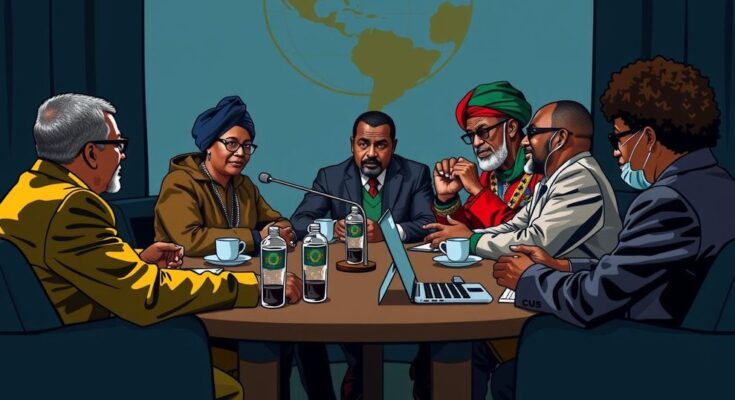The Commonwealth Heads of Government Meeting in Samoa addresses two pivotal issues: climate change effects on island nations and the ongoing discussion for reparations related to historical transatlantic slavery. Leaders are expected to focus on environmental protection strategies while also acknowledging the legacy of slavery as a cause for persistent racial inequalities among Commonwealth nations. The summit opens avenues for dialogue, despite the UK Prime Minister’s reluctance to formally address reparations.
The Commonwealth Heads of Government Meeting has commenced in Samoa, gathering leaders from 56 nations with historical ties to the British Empire. Central to this summit are critical discussions regarding climate change and the potential for reparations addressing Britain’s involvement in the transatlantic slave trade. Attendees include officials from various countries, with a particular focus on small island nations that are increasingly threatened by rising sea levels due to climate change. UN Secretary-General Antonio Guterres has highlighted the alarming rate at which ocean temperatures are increasing in the Pacific region, indicating it is three times faster than the global average. This crisis has prompted Australian Foreign Minister Penny Wong to label climate change as the foremost national security and economic threat facing the Pacific and many Commonwealth nations. Conversely, various African representatives have raised concerns over the escalating consequences of climate change, which threaten food security among other issues. As part of the summit’s proceedings, King Charles will explore areas in Samoa where rising sea levels have necessitated the relocation of communities. Furthermore, island leaders are anticipated to release a declaration prioritizing ocean preservation amidst extensive discussions regarding climate change. The summit also features a renewed dialogue on the contentious topic of reparations for the transatlantic slave trade. Although British Prime Minister Kier Starmer stated that the issue of reparations would not be officially addressed during the summit, he expressed willingness to engage in discussions with interested leaders. The Caribbean Community (CARICOM) has initiated a commission seeking reparations from former colonial powers like the UK and France. Those in favor of reparations argue that they are essential to address the ongoing racial inequalities stemming from a legacy of slavery, which was responsible for the forced transportation and enslavement of over 12.5 million Africans between the 15th and 19th centuries. As countries grapple with these pressing issues, CARICOM representatives view the Commonwealth meeting as a significant forum to advocate for reparations, emphasizing the need for openness to dialogue.
The Commonwealth of Nations, a political association of predominantly former territories of the British Empire, serves as a platform for collaboration among its member states. The current focus on climate change reflects the heightened urgency for action, given that many Commonwealth nations, particularly island states, are vulnerable to climate-related phenomena such as rising sea levels and extreme weather events. Furthermore, the discussion around reparations, which seeks to address historical injustices, has gained traction in recent years, especially in light of ongoing systemic racial disparities. The aftermath of the transatlantic slave trade remains a profound issue, with its impacts still felt across generations, emphasizing the need for reparative justice.
The summit in Samoa underscores the dual challenges of climate change and reparations within the Commonwealth framework. Leaders are confronted with the pressing realities of ecological threats while simultaneously addressing historical injustices associated with slavery. The commitment to dialogues around reparations reflects a broader acknowledgment of the legacy of the slave trade, while the emphasis on ocean protection speaks to the urgent environmental imperative faced by many Commonwealth nations. The outcomes of these discussions could potentially reshape the relationship between former colonial powers and the nations still grappling with the consequences of their shared histories.
Original Source: www.voanews.com




